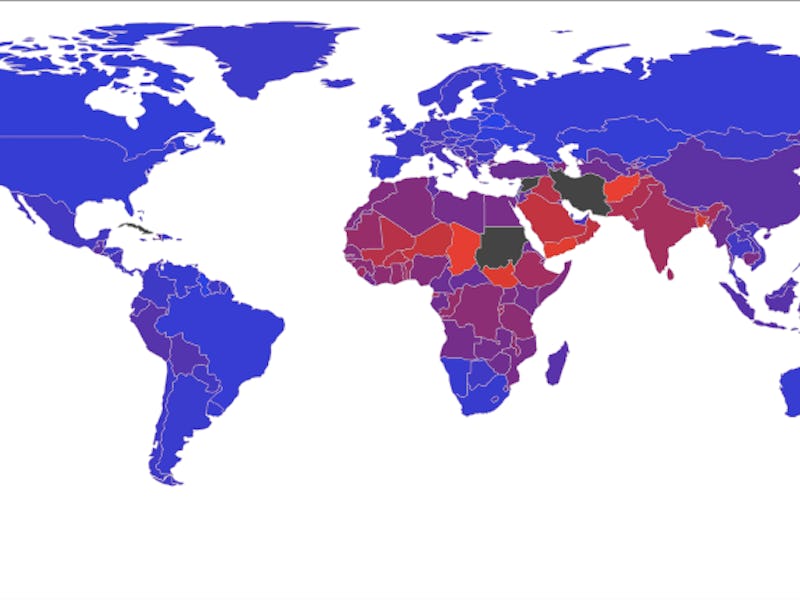Why Do More Men Use Facebook in These Countries?
A new study explores the great Facebook gender divide.

Social media marketers around the world have targeted women on Facebook because of the demographic fact that more women use the social network than men. A recently published study in the Proceedings of the National Academy of Sciences has explored Facebook use across the world and thinks there may be an explanation for why there’s a Facebook gender divide in some countries.
Using data collected through Facebook’s marketing API, researchers from the Complexity Science Hub Vienna and Universidad Carlos III de Madrid collected and analyzed public Facebook data of nearly 1.5 billion people from 217 countries, assigning positive values (in red) called the FBG to countries with more male Facebook users and negative values (represented in blue) to countries with more women Facebook users.
Red represents countries where more men use Facebook than women.
Mapping Inequality
The study found that while most countries had a majority-female Facebook population, the countries that did have majority-male Facebook populations had more skewed ratios, with Afghanistan, Chad, and Yemen being the most extremely gendered (you can explore the map in more detail here).
The data posed two interesting questions: why is Facebook dominated by men in these select few countries and why do women use Facebook more heavily in most countries?
The Facebook Gender Divide and Gender Equality
Lead author David Garcia and his team found that the FBG was significantly and negatively correlated with economic, educational, and health gender equality measurements from the World Economic Forum. Put simply, equal access to health services, education, and the economy of a country are all factors that increase the likelihood that Facebook use is close to equal by each gender.
Garcia tells Inverse the strength of the result took him by surprise: “This correlation that we found between the Facebook gender divide and other types of gender inequality, there’s a mirroring of inequalities online and offline, I didn’t expect to see it at these levels across countries.”
Garcia found that economic inequality was a function of the Facebook gender divide, but not the other way around, suggesting that if there is a causal relationship between the two, it is more likely that a shrinking Facebook gender divide impacts economic equality as well.
Benefits for Women Using Facebook
A primary finding of the study was that as more people join Facebook in a country, women become active on the platform at a rate faster than men.
“A possible explanation is that women get more value from Facebook than men,” Garcia posited over the phone. “This makes sense with the correlation we found over a period of years that countries with a low Facebook gender divide, tend to approach economic gender equality.”
What benefit could Facebook be providing that would help make countries more economically equal? Garcia speculated, “perhaps Facebook is helping connect women to things like jobs or housing.”
Another possible explanation is simply that women find more use out of the platform because of existing structural inequalities that they face in society. Because women face systemic discrimination in all parts of society, they may find more opportunity to fill the gaps in digital spaces like Facebook.